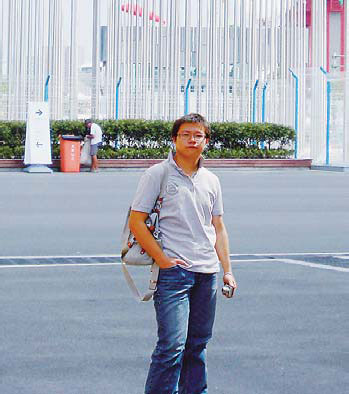Internet redefining Expo's role, content
 |
| Chen Shuai poses for photos in the Expo Garden. |
Before I visited the Expo Garden, I had been to several European countries, as well as many cities inside the United Kingdom, so I saw the Expo as an opportunity to compare Europe with other countries and continents.
I also expected to learn how different countries see themselves, or how they wish to market themselves in China.
From 1851, when the first World Expo was held in London, until the 1990s, the event has served as a platform of exchange for countries to show off their advanced or representative goods and commodities.
However, the World Expo has seen its influence wane over the last two decades, especially with the advent of the information era. As the Internet has become the most convenient and efficient platform for exchanging information, countries need to exhibit something more tangible - things that cannot so easily be shown in the virtual world - in order to keep the Expo a valid and credible event.
At Expo 2010 Shanghai, I have found that most countries are marketing what they are proud of, whether it is their natural environment, their sights and attractions, or their public policies.
As Chinese are becoming increasingly wealthy, investment opportunities are being marketed in the country now more than ever. The world at large is very aware of this and a number of pavilions have been promoting their country's high living standards.
Many pavilions also highlight their country's favorable policies and convenient services for tourists and investors.
The majority of Chinese visitors to the Expo 2010 Shanghai would probably not have considered living or investing overseas, or even researching such subjects online. So, for them, this way of introducing the pavilions has been both informative and appealing.
Furthermore, the domestic Chinese economy has benefited a lot from the Expo 2010 Shanghai, which has been billed as the most expensive World Expo in the event's history.
However, if all of the operational costs are taken into account, the event is probably going to be a huge money loser in the short term. This will hold true until the Chinese Government, and other participating governments, recoup their investments in terms of tourism and trade. But, in the long-term, the Expo is likely to show that the benefits it brings far outweigh the costs.
Expo 2010 Shanghai has also exposed Chinese consumers and investors to a wide range of new choices. The Urban Best Practices Areas (UBPA), the newest addition to the World Expo, is a case in point. It offers ecologically friendly solutions to problems relating to urbanization.
From producing energy-saving light bulbs to hydraulic power projects, companies have shown that they are playing a significant role in building better cities and more sustainable lifestyles.
Chen Shuai is a 24-year-old Expo tourist from Ningbo, Zhejiang province. He holds a master's degree in management from the University of Glasgow, UK.
 0
0 







Go to Forum >>0 Comments